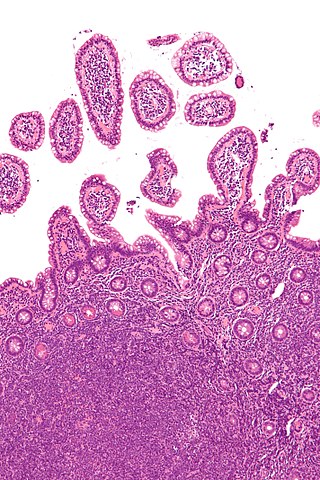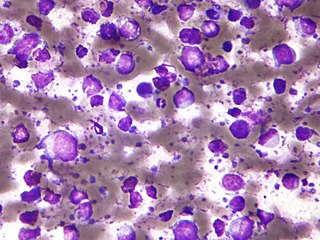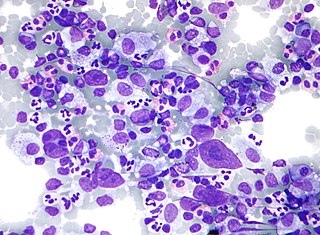Related Research Articles

Non-Hodgkin lymphoma (NHL), also known as non-Hodgkin's lymphoma, is a group of blood cancers that includes all types of lymphomas except Hodgkin lymphomas. Symptoms include enlarged lymph nodes, fever, night sweats, weight loss, and tiredness. Other symptoms may include bone pain, chest pain, or itchiness. Some forms are slow-growing while others are fast-growing.

Lymphoma is a group of blood and lymph tumors that develop from lymphocytes. The name typically refers to just the cancerous versions rather than all such tumours. Signs and symptoms may include enlarged lymph nodes, fever, drenching sweats, unintended weight loss, itching, and constantly feeling tired. The enlarged lymph nodes are usually painless. The sweats are most common at night.
AIDS-related lymphoma describes lymphomas occurring in patients with acquired immunodeficiency syndrome (AIDS).

In medicine, proton therapy, or proton radiotherapy, is a type of particle therapy that uses a beam of protons to irradiate diseased tissue, most often to treat cancer. The chief advantage of proton therapy over other types of external beam radiotherapy is that the dose of protons is deposited over a narrow range of depth; hence in minimal entry, exit, or scattered radiation dose to healthy nearby tissues.

The B-cell lymphomas are types of lymphoma affecting B cells. Lymphomas are "blood cancers" in the lymph nodes. They develop more frequently in older adults and in immunocompromised individuals.

Richard G. Pestell is an Australian American oncologist, endocrinologist and research scientist. Pestell was appointed an Officer of the Order of Australia for distinguished service to medicine and medical education in 2019 by Queen Elizabeth II. He was previously Executive Vice President of Thomas Jefferson University and Director of the Sidney Kimmel Cancer Center of Thomas Jefferson University. As a serial entrepreneur he founded six biotechnology companies developing cancer therapy and diagnostics. He is currently Distinguished Professor, Translational Medical Research, and the President of the Pennsylvania Cancer and Regenerative Medicine Research Center at the Baruch S. Blumberg Institute.

Serine/threonine-protein kinase Pim-2 is an enzyme that in humans is encoded by the PIM2.

Nodular lymphocyte predominant Hodgkin lymphoma (NLPHL) is a slow-growing CD20 positive form of Hodgkin lymphoma, a cancer of the immune system's B cells.

Hodgkin lymphoma (HL) is a type of lymphoma in which cancer originates from a specific type of white blood cell called lymphocytes, where multinucleated Reed–Sternberg cells are present in the patient's lymph nodes. The condition was named after the English physician Thomas Hodgkin, who first described it in 1832. Symptoms may include fever, night sweats, and weight loss. Often, nonpainful enlarged lymph nodes occur in the neck, under the arm, or in the groin. Persons affected may feel tired or be itchy.

Phosphoinositide 3-kinase inhibitors are a class of medical drugs that are mainly used to treat advanced cancers. They function by inhibiting one or more of the phosphoinositide 3-kinase (PI3K) enzymes, which are part of the PI3K/AKT/mTOR pathway. This signal pathway regulates cellular functions such as growth and survival. It is strictly regulated in healthy cells, but is always active in many cancer cells, allowing the cancer cells to better survive and multiply. PI3K inhibitors block the PI3K/AKT/mTOR pathway and thus slow down cancer growth. They are examples of a targeted therapy. While PI3K inhibitors are an effective treatment, they can have very severe side effects and are therefore only used if other treatments have failed or are not suitable.
Wafik El-Deiry is an American physician and cancer researcher who is the Associate Dean for Oncologic Sciences at the Warren Alpert Medical School, Brown University, Director of the Cancer Center at Brown University, and the Director of the Joint Program in Cancer Biology at Brown University and its affiliated hospitals. He was previously deputy director of Translational Research at Fox Chase Cancer Center, where he was also co-Leader of the Molecular Therapeutics Program.
VAMP regimen or VAMP chemotherapy is a four-drug combination chemotherapy regimen, used today in the treatment of Hodgkin lymphoma. It was one of the earliest combination chemotherapy regimens, originally developed as a treatment for childhood leukemia by a group of researchers at the National Cancer Institute led by Emil Frei and Emil Freireich. The first clinical trial of VAMP began in 1961. Because it was the first time that four chemotherapeutic agents were used at once, the trial was highly controversial at its time. Although new combination chemotherapy regimens have replaced the use of VAMP in the treatment of childhood leukemia, VAMP is considered an important precursor to modern treatments, confirming the effectiveness of combination chemotherapy and leading to the use of combination chemotherapy regimens to treat other types of cancer.
Thyroid lymphoma is a rare cancer constituting 1% to 2% of all thyroid cancers and less than 2% of lymphomas. Thyroid lymphomas are classified as non–Hodgkin's B-cell lymphomas in a majority of cases, although Hodgkin's lymphoma of the thyroid has also been identified.

Childhood cancer is cancer in a child. About 80% of childhood cancer cases in high-income countries can be successfully treated thanks to modern medical treatments and optimal patient care. However, only about 10% of children diagnosed with cancer reside in high-income countries where the necessary treatments and care is available. Childhood cancer represents only about 1% of all types of cancers diagnosed in children and adults. For this reason, childhood cancer is often ignored in control planning, contributing to the burden of missed opportunities for its diagnoses and management in countries that are low- and mid-income.
Livia Schiavinato Eberlin is a Brazilian analytical chemist who won a MacArthur "Genius" Fellowship for her research on the use of mass spectrometry to detect cancerous tissue.

Indolent lymphoma, also known as low-grade lymphoma, is a group of slow-growing non-Hodgkin lymphomas (NHLs). Because they spread slowly, they tend to have fewer signs and symptoms when first diagnosed and may not require immediate treatment. Symptoms can include swollen but painless lymph nodes, unexplained fever, and unintended weight loss.
Karen E. Knudsen is Chief Executive Officer of American Cancer Society and its advocacy affiliate the American Cancer Society Cancer Action Network. She is the first woman to hold that position in either organization.
Andrea A. Hayes Dixon is an American surgeon. She was the first pediatric surgeon to perform a high-risk, life-saving procedure in children with a rare form of cancer and developed the first orthotropic xenograft model of metastatic Ewing's sarcoma. In 2002, she became the first African American female pediatric surgeon board-certified in the United States.
Recurrent cancer is any form of cancer that has returned or recurred when a fraction of primary tumor cells evade the effects of treatment and survive in small spaces that are undetectable by diagnostic tests. The initial tumor may become the site of cancer’s return or it may spread to another part of the body. These surviving cells accumulate various genetic changes over time, eventually producing a new tumor cell. It can take up to weeks, months, or even years for cancer to return. Following surgery and/or chemotherapy or radiotherapy, certain tumor cells may persist and develop resistance to treatment and eventually develop into new tumors. Age, sex, cancer type, treatment duration, stage of advancement, and grade of original tumor are some of the factors that determine the rate of cancer recurrence. If recurrent cancer has already moved to other body parts or has developed chemo-resistance then it may be more aggressive than original cancer. In general, the severity of cancer increases with a shorter duration of time between initial treatment and its return.
Gabriele Ursula Dachs is a New Zealand academic, and is a full professor at the University of Otago, specialising in the how cancer cells respond to hypoxia, and developing novel treatments for cancer.
References
- 1 2 "Chelsea C. Pinnix". MD Anderson Cancer Center. Retrieved 2021-02-17.
- ↑ "Here's What Radiation Is Like for Non-Hodgkin Lymphoma". SurvivorNet. Retrieved 2021-02-17.
- ↑ "Radiation May Be a Useful Bridging Therapy to CAR-T Treatment in Relapsed/Refractory Non-Hodgkin Lymphoma". Cancer Therapy Advisor. 2020-10-28. Retrieved 2021-02-17.
- 1 2 "Chelsea Pinnix (M7)". Meyerhoff Scholars Program. Archived from the original on 2020-10-20. Retrieved 2021-02-17.
- ↑ "Chelsea Pinnix, MD-PhD" (PDF). Leadership Alliance.